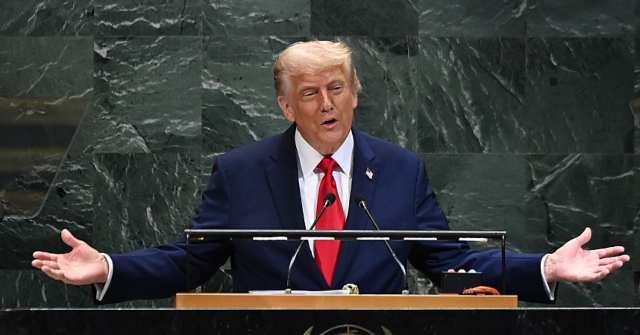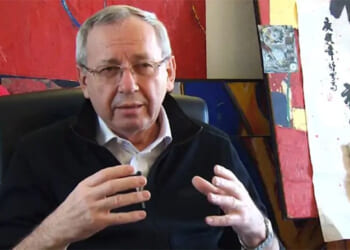The administration of President Donald Trump this week received unprecedented support at the United Nations from countries joining the U.S. in voting against the yearly, quasi-traditional symbolic resolution condemning the “embargo” against communist Cuba.
For decades, the communist Castro regime has spearheaded efforts towards yearly U.N. resolutions demanding that the United States lifts its so-called “embargo” on the island-nation, a U.S-designated state sponsor of terrorism (SST). The only recent year it did not bring the matter to a vote was 2020 as a result of the Wuhan Coronavirus pandemic.
The Castro regime has spared extensive efforts throughout the years presenting the false narrative that the “embargo” is the cause of all of Cuba’s shortcomings when in reality, it is the decades’ worth of failed communist policies, brutal repression, and lack of basic fundamental freedoms that have caused a dire humanitarian crisis in Cuba. The country is now on the brink of complete ruin and forced its diminishing population to live through severely inhumane conditions.
In reality, the “embargo,” is a series of measures that mildly limit economic activity between the two countries. The “embargo” does not hinder nor prevent the shipping of medicine or humanitarian supplies — especially in emergency situations, such as the aftermath of hurricane Melissa, which passed through Cuba and other countries in the region this week.
The “embargo” does not limit Cuba’s ability to import food from the United States. Martí Noticias reported in August that, as of June 2025, U.S. exports to Cuba reached $38.4 million this year, a ten-percent increase when compared to June 2024. Of the total, $21 million represented chicken products, 55 percent of all total U.S. exports to Cuba. Martí Noticias said at the time that the food does reach Cuban ports but it “does not reach the warehouses,” and pointed out at the Castro regime’s rationing card, a highly ineffective food rationing policy that has existed since 1963.
Additionally, the “embargo” does not forbid other countries from funding the Castro regime nor providing the ruling communists with international financial aid — such as this week, when the government of Germany donated $330,000 to the Cuban regime with the alleged intention that the funds would be used to “assist” victims of Hurricane Melissa.
On Wednesday, the United Nations approved the 2025 edition of the yearly resolution condemning the United States’ “embargo” on Cuba and demanding its end. The resolution passed with 165 countries voting in favor, down from 2024‘s 187 votes.
Historically, Israel has been the only country that has consistently supported the United States throughout the years in voting alongside America against the resolution. However, this week saw Israel, Argentina, Hungary, Paraguay, North Macedonia, and Ukraine join the United States, bringing the total of votes against the resolution up to an unprecedented seven.
Twelve countries — Albania, Bosnia and Herzegovina, Costa Rica, Czechia, Ecuador, Estonia, Latvia, Lithuania, Morocco, Poland, Moldova and Romania — abstained from voting. The United Nations noted the increase in votes against and nations abstaining as “a noticeable shift” in U.N. member states.
Prior to 2025’s unprecedented vote, other countries had abstained from voting at the “embargo” resolution in certain occasions, such as the case of Brazil, who during the administration of conservative former President Jair Bolsonaro, abstained from voting in the 2022 and 2021 iterations of the resolution against the “embargo.” Colombia, during the administration of conservative former President Ivan Duque, also abstained from voting in 2021 and 2019.
Ukraine, one of the seven countries that voted against the 2025 resolution, shifted from abstaining in recent years to outright voting against the resolution. Ukraine has repeatedly denounced — with substantial evidence — that the Castro regime has consistently supplied Russia with Cuban mercenaries to fight in the ongoing invasion of Ukrainian territory. This week, the Ukrainian government announced the shutdown of its embassy in Havana over Cuba’s continued support of Russia.
“We remember Cuban President’s wish of ‘success’ to Putin in his war of aggression against Ukraine. We heard it well. This year, we decided to close our embassy in Havana and downgrade our diplomatic ties,” Ukrainian Foreign Minister Andrii Sybiha explained during the U.N. resolution vote. “Our vote is not against the Cuban people — we respect their right to live in prosperity. It is against the inaction of Cuba’s authorities in response to massive recruitment of Cuban citizens to the Russian occupation army.”
In the days leading up to this week’s U.N. vote, the U.S. State Department held a social media campaign explaining that the “embargo” is not the cause of the collapse of Cuba, which is the direct result of the disastrous communist policies of the Castro regime.
“Voting with the Cuban regime means supporting their repression of religious leaders, Ladies in White, UNPACU, San Isidro movement, and all those Cubans brave enough to raise their voice for the cause of freedom,” one of the State Department’s posts read.
“Cuba imports food, medicine, and humanitarian goods freely, which is allowed by the embargo. In just the last year, U.S. exports to Cuba increased by 16 percent, with $585 million USD flowing into the island in 2024,” the State Department pointed out in another post.
Over the past ten years, the only year in which both the United States and Israel abstained from voting in a resolution against the “embargo” instead of outright voting against it was 2016, during the administration of former President Barack Obama amid a series of policies from Obama appeasing the Castro regime known as the “Cuban thaw,” which granted numerous concessions to the Castro regime, who nevertheless maintained its brutal communist repression of Cubans.
Christian K. Caruzo is a Venezuelan writer and documents life under socialism. You can follow him on Twitter here.
















